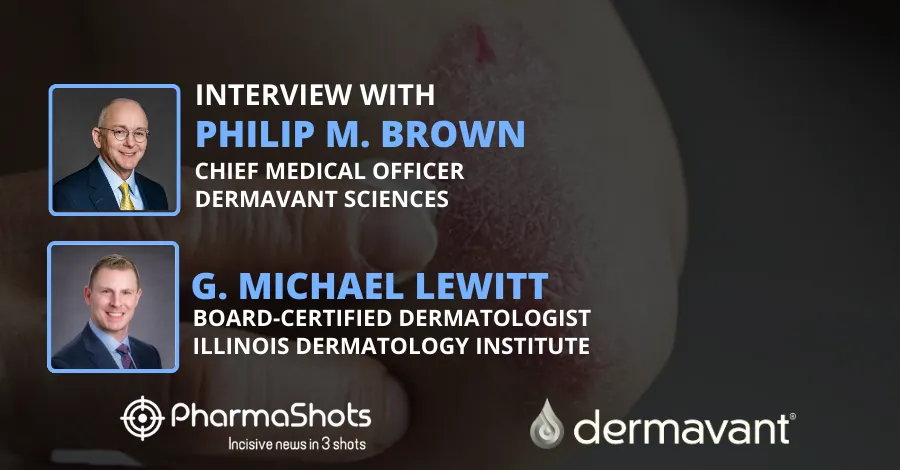
James Graham, CEO of Recce Pharmaceuticals Shares Insights from the Expansion and Acceleration of Clinical Programs
Shots:
- James gave an overview of the timeline of Recce Pharmaceuticals' clinical programs with several significant data read-outs in 2022 and 2023
- He emphasized the study design and results from the different infectious disease clinical and preclinical programs in its product portfolio
- The interview highlights how the development and commercialization of New Classes of Synthetic Anti-Infectives to solve global health problems of antibiotic-resistant viral pathogens
Smriti: Give our readers a brief view of Recce Pharmaceuticals' timeline for the expansion of the clinical program
James Graham: Our lead anti-infective candidate, RECCE® 327 (R327), will be advancing into a Phase Ia/IIb intravenous multiple ascending dose safety and tolerability study and a Phase II clinical trial investigating the efficacy of R327 against diabetic foot ulcer (DFU) infections.
Following the success of our Phase I intravenous (I.V.) safety study, R327 will be advancing to single and multiple-dose evaluations of efficacy in urinary tract infections. The Phase Ib/IIa intravenous multiple-dose safety and tolerability study is expected to see first patient dosing in the early part of next year.
Exploring mild skin and soft tissue infections, a concurrent Phase II clinical trial will assess the efficacy of R327 as a spray-on (topical) broad-spectrum antibiotic therapy for diabetic foot ulcers (DFU) with first patient dosing expected in coming months.
Smriti: What results have you seen thus far of R327 in bacterial infections? What are your expectations from the Phase 2 results?
James Graham: Data from our in-human Phase I (I.V.) safety study, revealed high concentrations of R327 in the urine of healthy subjects, which is consistent with in vivo animal studies of kidney and UTI bacterial infections. This demonstrates the potential of R327 to have efficacy in the human urinary tract against infections.
In our burn-wound infection Phase I/II clinical trial, interim data showed wounds with healthy skin growth return, reduced swelling and infection and indications of tissue penetration to underlying infection. These encouraging results support the company’s expansion into the Phase II trial of Diabetic Foot Ulcer (DFU) Infections.
We look forward to initiating the Phase Ib/IIa and Phase II trials and believe in the potential of R327 to improve the lives of patients suffering from both UTIs and DFUs to change the treatment landscape for the millions of people who are diagnosed with these potentially life-threatening infections each year.
Smriti: Highlight the study design of the new Phase 2 trial of R327 for the treatment of urinary tract infections (UTIs).
James Graham: The Phase Ib/IIa clinical trial will be a multiple ascending-dose study for the treatment of uncomplicated UTI’s and seek to progress to complicated, resistant, and chronic infections. UTIs are the most common outpatient infections in the U.S. with a prevalence of 20% in women over the age of 65 and approximately 11% in the overall population with many being recurrent/antibiotic resistant infections. This clinical trial is supported by the data received for our successful Phase I I.V. study, and the company looks forward to first patient dosing early next year.
Smriti: Give us some insights from the new Phase 2 study of R327 for diabetic foot ulcer infections.
James Graham: The Phase II trial will be conducted at a leading teaching hospital in New South Wales, Australia and will provide proof of concept for the efficacy and tolerability of R327 as a spray-on (topical) broad-spectrum antibiotic therapy for diabetic foot ulcers (DFU). DFU is an extremely severe condition with a probability of amputation within one year after the first ulcer or gangrene of 34.1% and a mortality rate of 5.5%. The company looks forward to progressing the study and providing market updates accordingly.
Smriti: What are the other preclinical programs that Recce Pharmaceuticals has or is currently working on?
James Graham: Pre-clinical in vivo studies in mice have shown that R327 can eradicate nasal Streptococcus pneumoniae (S. pneumoniae) infection, the most common bacterial cause of sinusitis affecting 28.9 million people in the U.S. each year, making it one of the most common health problems. In a separate study R327 was also extremely effective at killing Mycobacterium abscessus (M. abscessus) infection in mice following nasal delivery, thus achieving proof of concept. M. abscessus has emerged as one of the most important lung pathogens in cystic fibrosis with current treatments proving to be ineffective.
In vitro experiments have shown that R327 has the ability to disrupt cellular bioenergetics and also efficiently kill Escherichia coli (E. coli) in both growing and non-growing cells as well as cells in a biofilm. In vivo data showed R327 has a dose-dependent antibacterial effect against E. coli in the kidney and bladder of rats at 50mg/kg and 500mg/kg when compared to vehicle control (p<0.050).
R327 has demonstrated anti-viral activity against SARS-CoV-2 in Syrian hamsters, the gold-standard animal model for preclinical COVID-19 research. Treatment with R327 significantly reduced SARS-CoV-2 levels in a dose-dependent manner in throat swab samples collected from infected animals. This study provides proof of concept that intra-nasal treatment with R327 has the potential to reduce SARS-CoV-2 levels during infection.
R327 has also demonstrated bactericidal activity against all six ESKAPE pathogens, antibiotic-resistant bacteria (dubbed 'ESKAPE’ due to their propensity of 'escaping' the biocidal action of antibiotics). R327 exhibited more than 99.9% efficacy following an in vivo screening assay against the six bacterial strains.
Smriti: Are you looking forward to bringing R327 in more indications as well?
James Graham: Through their multi-layered mechanisms of action, Recce’s anti-infectives have the potential to overcome the hypercellular mutation of bacteria and viruses, the challenge of all existing antibiotics to date. We look forward to showcasing the broad-spectrum potential of R327 to target a variety of infections caused by even the most resistant and difficult-to-treat bacteria. Based on compelling preclinical data, we are continuing to explore the potential for R327 in clinical indications such as cystic fibrosis and Bacterial Sinusitis. The company will continue to address the urgent global health problems of antibiotic-resistant superbugs and emerging viral pathogens through multiple indications.
Image Source: Canva
About the Author:

James Graham is the CEO of Recce Pharmaceuticals. James previously served as Recce’s executive director, where he helped advance the company’s anti-infective pipeline and establish strategic partnerships. Under his leadership, Recce is on a growth path as an emerging global health leader in synthetic anti-infectives by pioneering the development and commercialization of new classes of synthetic anti-infectives. James received his Bachelor of Commerce in entrepreneurship and innovation from Murdoch University.
Tags

Senior Editor at PharmaShots. She is curious and very passionate about recent updates and developments in the life sciences industry. She covers Biopharma, MedTech, and Digital health segments along with different reports at PharmaShots.













